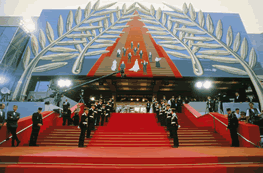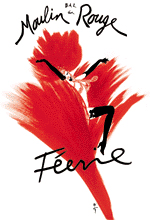Forget Politics Think Cannes Film Festival
- SUBSCRIBE
- ALREADY SUBSCRIBED?
BECOME A BONJOUR PARIS MEMBER
Gain full access to our collection of over 5,000 articles and bring the City of Light into your life. Just 60 USD per year.
Find out why you should become a member here.
Sign in
Fill in your credentials below.
 Yes, France just elected a new President.
Yes, France just elected a new President.
Yes, it’s gearing up for divisive parliamentary follow-up elections.
Yes, the country is setting off in new directions and with a new style.
But this is France. Let’s stick to basics.
What is giving those merely political events incredible competition for the daily headlines in France at the moment?
Of course, it’s the Cannes film festival’s monumental celebration of its 60th anniversary with its more than usual bevy of international cinema stars, movie moguls, journalists and die-hard movie fans crowding the cafes, restaurants, hotels and film projection centers on the resort city’s Mediterranean sea front.
Despite the nation’s currently intense political activity, many of the country’s top TV or radio newscasters have moved from Paris to report for the duration of the festival from seafront broadcasting studios in Cannes. Simultaneously, nightly French television programs, have shelved many of their political, historical or societal subjects to offer re-runs of prize-winning films or cinema-oriented documentaries.
This year’s commemoration will feature the usual line-up of glittering cinema names—George Clooney, Brad Pitt, Leonardo DiCaprio, Catherine Deneuve, Alain Delon, Martin Scorsese, Dustin Hoffman, Juliette Binoche and many others.
The prize winners will get their awards, thank their collaborators profusely and enjoy the spotlight, as will the cinema industry, for a relatively short moment.
In essence, however, the great attraction of Cannes at festival time is not so much its films or prizes, or stars or starlets. It’s the aura and the atmosphere.
By conservative count, without even beginning to include thousands of movie buff sightseers, some 30,000 accredited festival participants including 4,000 international journalists will be attending the May 16-27 festival which opened in strict accordance to ritual with privileged black-tie or evening-gowned first-nighters making the traditional ascent up the Festival palace’s red-carpeted steps to see Hong Kong-born director Wong Kai Wai’s sentimental American road movie “My Blueberry  Nights.”
Nights.”
The film features American actor Jude Law and singer Norah Jones in her first acting role.
Some 21 feature films, six of them American, are in competition for the event’s coveted Palme d’or, Golden Palm top prize but the festival, which had more than 1,600 films submitted and will be giving 1,500 projections in some 28 locations, has, over the years, created so many sub-category prizes in and out of competition that the total number of awards to be handed out runs to several dozen. Six prizes in all were given in 1947.
To handle the its vast operation the festival has a budget of 20 million Euros , roughly 27 million dollars, half of it furnished by the French government to support its cultural reputation. The rest comes from various cinema industry sponsors.
All that helps to pay for a 1,200-strong festival staff including 500 security agents, 120 hostesses, 100 chauffeurs, 70 projectionists, 50 logistics specialists and 100 press assistants.
That staff is well occupied.
From early morning until well past midnight the city’s famed, delicately arching seaside walk, the Croisette, is thronged as usual with festival participants plus journalists and cameramen dashing from press conferences to film showings to lunches, cocktails, dinners and interviews with the stars, producers or directors of the films being shown.
As a rule the most prestigious of such gatherings take place on the flotilla of private luxury yachts that moor or anchor in the city’s large harbor during the festivities. The most significant, in the long run, are the innumerable back-room conferences among cinema producers and buyers, the economic life-line of the industry.
Airline reservations to and from neighboring Nice airport are virtually unobtainable and Cannes’ generally abundant lodging and dining facilities are booked solid as are many of those in neighboring coastal settlements.
One newspaper jestingly suggested that the best way to incur an abrupt and humiliating rejection in Cannes or on the nearby coast during the festival was to show up and try to enter a restaurant or even a chic seaside cafe without reserving in advance.
Casually visiting Cannes at festival time if you are not involved and accredited is not necessarily a good idea.
The festival’s history is a film saga in itself. The first one planned in 1939 had to be cancelled at the last minute because of the outbreak of World War II. Picked up again at the end of the war in 1947 it got off to a hesitant start and had to cancel its planned festivities in 1948 and 1950 for lack of funding. In 1968 the festival again was interrupted and broken off by the outbreak of student unrest and national social turmoil. Since then, however, its fortunes have been on a steady upgrade with more and more participants, films in contention and prizes awarded each year.
Although Cannes juries still have a tendency to honor films which win critical praise but flop at the box office, festival officials doggedly defend that policy. They insist that it represents a deliberate effort to bring new cinema talent to the fore and favor promising but lightly funded writers and directors and not let big budget producers dominate the field. That explains why normally only about one-quarter of the accepted festival entries stem from major Hollywood or other film studios.
Originally dominated by West European and American films—Walt Disney’s flying elephant “Dumbo” won an award at the first festival in 1947 as did Vincent Minelli’s “Ziegfield Follies”—recent years have brought to prominence films from Chinese, Japanese, Indian and East European directors as well.
But in all the festival’s history, the film of only one female director has walked off with the Palme d’Or, New Zealand Director Jane Campion’s “The Piano Lesson,” in 1993.
In any event, Cannes’ momentary static on the French political scene
isn’t all that bad. It’s almost a relief from the political battle raging in France for the last six months and heading to a crunch period again with two-tier parliamentary elections scheduled for June 10 and 17.
Those elections will determine what kind of a hand France’s new President, Nicolas Sarkozy, will have to implement the multitude of reforms he has promised the nation. And they will take everyone back to a different kind of basics.


